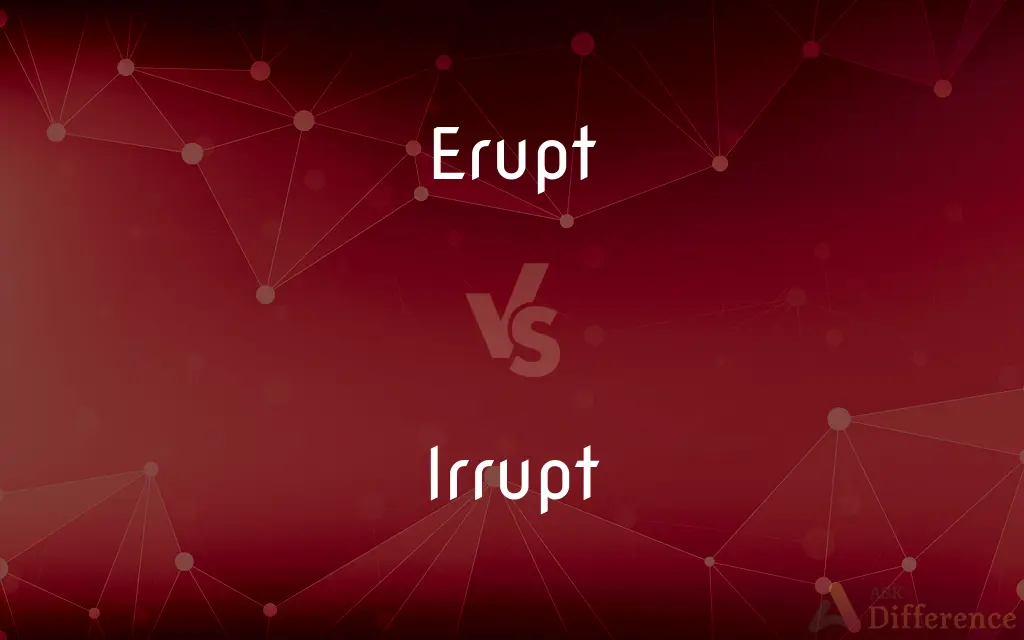Erupt vs. Irrupt — What's the Difference?
By Fiza Rafique & Urooj Arif — Updated on March 27, 2024
Erupt refers to a sudden, often violent, breaking out or bursting forth, while irrupt is mainly used in ecology to describe a sudden increase in an animal population.

Difference Between Erupt and Irrupt
Table of Contents
ADVERTISEMENT
Key Differences
Erupt is commonly associated with volcanoes, skin conditions, or situations where tension or violence breaks out suddenly. It conveys a sense of suddenness and often, a release of energy or emotion. Whereas, irrupt, although less commonly used, specifically describes a phenomenon in ecology where there is a sudden and often unexpected increase in the population of a species in an area. This term is typically used to refer to wildlife and is not associated with the violent or forceful connotations of erupt.
While erupt can be applied to a variety of contexts, including geological, medical, and social situations, irrupt is almost exclusively used in ecological and biological studies. Erupt might describe a volcano spewing lava, a sudden outbreak of conflict in a community, or the rapid appearance of spots on the skin. On the other hand, irrupt might be used to describe a sudden influx of birds into a new area due to food scarcity elsewhere.
The implications of each term also differ significantly. Erupt often implies destruction or the emergence of something negative, such as an eruption of violence or disease. In contrast, irrupt can have either positive or negative ecological implications, depending on the context. An irruption of a predator species, for example, could be positive for controlling an overpopulated prey species but could also lead to imbalance if the predator's population becomes too large.
Both terms share a root in the Latin "rumpere," meaning "to break," but their prefixes lead to their differing usages. "E-" in erupt suggests "out," indicating a breaking out or bursting forth. Meanwhile, the prefix "ir-" in irrupt suggests "into" or an inward action, which aligns with the idea of animals moving into an area in large numbers.
Despite their differences, both terms indicate a sudden change from a previous state. Erupt emphasizes a more general and often violent or noticeable break from normalcy, whereas irrupt focuses on a specific ecological event characterized by a sudden population increase. Understanding the context in which each term is used helps clarify their meanings and applications.
ADVERTISEMENT
Comparison Chart
Definition
A sudden, often violent, outbreak or burst.
A sudden increase in an animal population.
Context
Geological, medical, social
Ecological, biological
Connotations
Often negative, associated with violence
Neutral, relates to natural population dynamics
Usage
Broad, applicable in various contexts
Specific, used in ecology and biology
Implications
Destruction, emergence of negatives
Changes in population dynamics, can be positive or negative
Compare with Definitions
Erupt
To burst forth suddenly and violently.
The volcano erupted, sending ash clouds into the sky.
Irrupt
Fluctuations in population density leading to mass movements.
The annual irrupt of elk to lower elevations is a sight to behold.
Erupt
To break out or appear rapidly.
Rash erupted all over his body overnight.
Irrupt
A phenomenon where wildlife populations exceed the carrying capacity.
An irrupt of locusts caused extensive crop damage.
Erupt
To express emotions suddenly and forcefully.
She erupted in laughter at the joke.
Irrupt
The sudden appearance of a species in non-native habitats.
The irrupt of snowy owls caught birdwatchers by surprise.
Erupt
To emerge suddenly and forcefully.
A geyser erupted, startling the tourists.
Irrupt
A sudden increase in the population of a species.
The irrupt of rabbits overwhelmed the local ecosystem.
Erupt
To suddenly become active or violent.
The protest erupted into chaos.
Irrupt
To move into a new area in large numbers.
Starlings irrupted into the region in search of food.
Erupt
(of a volcano) become active and eject lava, ash, and gases
Mount Pinatubo began erupting in June
Irrupt
Enter somewhere forcibly or suddenly
Absurdities continually irrupt into the narrative
Erupt
Break out suddenly and dramatically
Noise erupted from the drawing room
Fierce fighting erupted between the army and guerrillas
Irrupt
To break or burst in
The boys irrupted into the kitchen.
Erupt
Give vent to anger, amusement, etc. in a sudden and noisy way
The soldiers erupted in fits of laughter
Irrupt
(Ecology) To increase rapidly in number, especially beyond the normal range
Snowy owls that irrupted southward.
Erupt
(of a spot, rash, or other mark) suddenly appear on the skin
A boil had erupted on her temple
Irrupt
(transitive) To break into.
Erupt
(of a tooth) break through the gums during normal development
The lower incisors had erupted
Irrupt
(intransitive) To enter forcibly or uninvited.
Erupt
To throw or force something out violently, as lava, ash, and gases
The volcano erupted.
Irrupt
(intransitive) To rapidly increase or intensify.
Erupt
To be thrown or forced out
Water erupted from the geyser.
Irrupt
Enter uninvited;
They intruded on our dinner party
She irrupted into our sitting room
Erupt
To develop suddenly
Violence erupted during the protests.
Irrupt
Erupt or intensify suddenly;
Unrest erupted in the country
Tempers flared at the meeting
The crowd irrupted into a burst of patriotism
Erupt
To express oneself suddenly and loudly
He erupted in anger.
Irrupt
Increase rapidly and in an uncontrolled manner;
The population of India is exploding
The island's rodent population irrupted
Erupt
To break through the gums in developing. Used of teeth.
Erupt
To appear on the skin. Used of a rash or blemish.
Erupt
(intransitive) To eject something violently (such as lava or water, as from a volcano or geyser).
The volcano erupted, spewing lava across a wide area.
Erupt
(intransitive) To burst forth; to break out.
The third molar tooth erupts late in most people, and sometimes does not appear at all.
Erupt
To spontaneously release pressure or tension.
The crowd erupted in anger.
Erupt
(Of birds, insects, etc.) To suddenly appear in a certain region in large numbers.
Erupt
To cause to burst forth; to eject; as, to erupt lava.
Erupt
To eject something, esp. lava, water, etc., as a volcano or geyser; as, when Mount Saint Helens erupted, some people were taken by surprise.
Erupt
To burst forth; to break out, as ashes from a volcano, teeth through the gums, etc.; as, the third molar erupts late in most people, and in some persons does not occur at all.
When the amount and power of the steam is equal to the demand, it erupts with violence through the lava flood and gives us a small volcano.
Erupt
Start abruptly;
After 1989, peace broke out in the former East Bloc
Erupt
Erupt or intensify suddenly;
Unrest erupted in the country
Tempers flared at the meeting
The crowd irrupted into a burst of patriotism
Erupt
Start to burn or burst into flames;
Marsh gases ignited suddenly
The oily rags combusted spontaneously
Erupt
As of teeth, for example;
The tooth erupted and had to be extracted
Erupt
Become active and spew forth lava and rocks;
Vesuvius erupts once in a while
Erupt
Force out or release suddenly and often violently something pent up;
Break into tears
Erupt in anger
Erupt
Appear on the skin;
A rash erupted on her arms after she had touched the exotic plant
Erupt
Become raw or open;
He broke out in hives
My skin breaks out when I eat strawberries
Such boils tend to recrudesce
Common Curiosities
Can diseases erupt?
Yes, referring to the sudden outbreak or increase in cases.
Is irrupt used outside of biology?
It's primarily used in ecological and biological contexts.
What does it mean for a volcano to erupt?
It means the volcano has become active, expelling lava, ash, and gases.
What is an ecological irrupt?
It’s a sudden increase in the population of a species in an area.
How do scientists predict animal irruptions?
Through studying environmental cues, food availability, and population dynamics.
What causes animals to irrupt into new areas?
Factors like food scarcity, environmental changes, or population pressure.
Is an eruption always violent?
While often violent, eruptions can also refer to non-violent sudden appearances, like rashes.
Can irruptive species affect human activities?
Yes, they can impact agriculture, conservation efforts, and even urban areas.
Can a person erupt?
Yes, in a metaphorical sense, referring to the sudden expression of emotion.
What is the difference between erupting and exploding?
Erupting refers to a sudden outbreak or burst, while exploding implies a sudden and violent shattering or blowing apart, often with a loud noise.
Are all volcanic eruptions dangerous?
Not all, but they can pose significant risks depending on the eruption type and proximity to populated areas.
How do ecologists manage irruptive species?
Through monitoring, habitat management, and sometimes population control measures.
What's the impact of irruptive species on native wildlife?
It can be complex, potentially beneficial by increasing biodiversity or detrimental by competing with native species.
Can emotional eruptions be positive?
Yes, people can erupt in laughter or joy, indicating a sudden expression of positive emotions.
Why is understanding eruptions important?
For disaster preparedness, public safety, and understanding Earth's geologic processes.
Share Your Discovery

Previous Comparison
Outdoor vs. Outdoors
Next Comparison
Dorf vs. DwarfAuthor Spotlight
Written by
Fiza RafiqueFiza Rafique is a skilled content writer at AskDifference.com, where she meticulously refines and enhances written pieces. Drawing from her vast editorial expertise, Fiza ensures clarity, accuracy, and precision in every article. Passionate about language, she continually seeks to elevate the quality of content for readers worldwide.
Co-written by
Urooj ArifUrooj is a skilled content writer at Ask Difference, known for her exceptional ability to simplify complex topics into engaging and informative content. With a passion for research and a flair for clear, concise writing, she consistently delivers articles that resonate with our diverse audience.















































